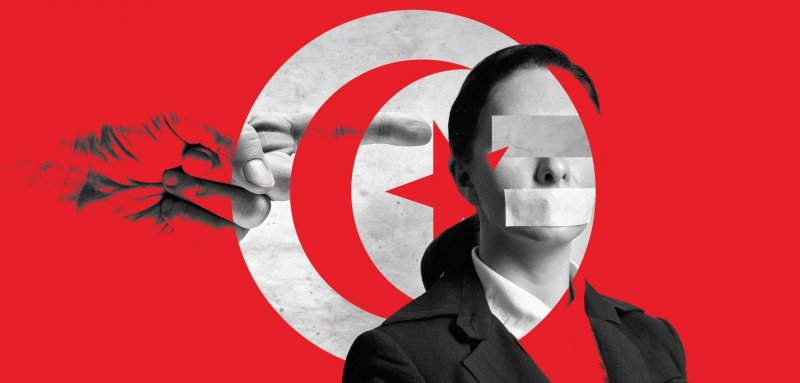“In late 2019, I found myself subjected to great pressure by the governor and regional officials to force me to approve development projects and special benefits – in clear violation of the law – for the benefit of certain individuals, including a member of Parliament as well as members of political parties” recounted Hinda Harrabi Ben Khoder to Raseef22. Ben Khoder, who has been running an “implementation plan” (an administrative position title in local governing) since February 1st, 2017 in the Zaramidin region in the Monastir governorate, insisted on abiding by the law.
In turn, Governor Akram Sabri threatened her with dismissal from work for not complying with his orders. According to Hinda, his harassment further increased to the point of inciting others against her and threatening her over the phone.
“Prepare your suitcase, you have to obey my orders and carry out everything I ask of you,” the Governor once told her. The Mayor even went as far as beating her during one meeting, which led her to file a lawsuit against him.
Ben Khoder opted to follow legal methods. On January 22nd, 2020, she met with the Director General of Governance at the Ministry of Interior, Najeeb Balkhir, and handed him a corruption file that contains administrative trespasses by the governor. Then, on their next meeting on February 3rd, she handed him another file related to national security, and an investigation into the issue was launched.

Vindictive Measures and Distress Calls
“During the Coronavirus pandemic, in March 2020, I learned that the Governor had been informed of the files I had submitted to the interior ministry,” says Ben Khoder, adding “with the enforcement of a full lockdown and a state of emergency in the country, [the mayor] took advantage of the situation to rev up his vindictive measures against me.”
The Governor issued commands to Ben Khoder’s mayoral colleagues and fellow employees to stop cooperating with her. He verbally reassigned Ben Khoder’s tasks to one of her co-workers, while she was still in office. Ben Khoder then reached out to the Interior Ministry’s general inspector, who promised to intervene. That was the last she heard from him.
The Governor also gave orders to police aids to restrict Ben Khoder’s mobility, effectively placing her under house arrest in her home at the municipality headquarters (local government). She reached out to the president and prime minister, as well as the Ministry of Interior, but has yet to receive any response from them.
Ben Khoder accuses the Governor of supplying her personal housekeeper with drugs in an attempt to frame her that would have been successful had Ben Khoder not discovered the plot. In April 2020, unidentified individuals broke into Ben Khoder’s home after dislodging her front door and verbally abusing her. Security officers took two hours to respond to her emergency distress call, and the product of their quick visit was a report in which they denied the occurrence of any disturbance or assault, according to Ben Khoder.

Following the incident, on April 19th, 2020, Ben Khoder let out a cry for help on the media, asking the President, Prime Minister, and interior Minister to intervene. The following day, she was met with a sudden statement relieving her of her duties, posted on the Facebook page of the Interior Ministry. Twelve hours following the announcement, two officers from the governorate -- accompanied by a security detail -- evicted Ben Khoder in a “demeaning” manner from her employee residence and without presenting an eviction notice.
Ben Khoder stresses that she should have been served an official notice of relief from duty, like the hiring announcement that gets published in the state-official newspaper of Tunisia, Al Raed Newspaper. To this day, she’s demanding the notice from the Interior Ministry, but hasn’t received any response.
“In late 2019, I was subjected to great pressure by the Governor to force me to pass development projects and special benefits – unlawfully – for the benefit of certain individuals, including an MP and political party members”
Meanwhile, the threats against her resumed, to the extent of targeting her home in the Zaghouan Governorate on April 28, 2020. Shots were fired at her house by unknown individuals, an ongoing investigation that was opened has still yielded no results.
Ben Khoder claims that the National Anti-Corruption Body (INLUCC) did not cooperate with her until a new head, Imed Boukhris, was assigned. According to Ben Khoder, a hearing was held with her in November 2020, “with no progress recorded.”
The INLUCC is a public anti-corruption agency that was set up by decree No. 120 for the year of 2011. Its mission includes proposing anti-corruption policies and monitoring their implementation by contacting the relevant authorities.
Today, Ben Khoder lives in “a state of ambiguity,” caught between resuming her duties and resigning her post. She complains about the lack of government response to her case.
Confidential Documents in the Restroom
“I found some official files in the restroom at the place I was working in the Border Health Control Center of the Health Ministry’s Port of Sousse. The official documents contained details confirming the drowning of foreigners in Tunisian territorial waters with no current knowledge of their whereabouts. They also document the death of a number of foreign ship captains in the Port of Sousse, and the subsequent cover-up of said deaths without informing the relevant authorities,” so says former inspector at the station Nawal Al-Mahmoudi to Raseef22.
The hidden official documents included various expired food shipments entering through the port as well as the names of the individuals who admitted the cargo without monitoring and analyzing them. The corruption informant states that all this is taking place with the complicity of one family whose members alternated managing the center – from the father, to the family relative, and finally to the son who is currently under arrest.
Al-Mahmoudi revealed that 250 tons of spoiled wheat from Ukraine had entered through the port in August 2019 without being analyzed, in violation of the law that stipulates that the analysis team must go out to sea before letting the cargo in, conduct the analysis, wait for the results, and spray it with medicines to avoid transmitting diseases. This did not happen, according to Al-Mahmoudi, who witnessed the incident and refused to mark this shipment after noticing the dark color and tint of the wheat.

Al-Mahmoudi submitted all the files in her possession to the National Anti-Corruption Commission in September 2019 and to the Presidential administration on February 11th, 2020. The commission then issued a decision to protect her on September 23rd, 2019. However, she attests that the decision was not fully implemented, as she was only provided with physical protection during her work in the Sfax Governorate, even though she works in Sousse – her workplace headquarters – and is assigned to occasional tasks in Sfax and the capital Tunis.
Tunisia failed to protect whistle-blowers and fight corruption, many have paid the bill for reporting corruption and were subjected to harassment. Corruption became systemic and anything said to combat it are political slogans with no real effect
In September 2019, one of those implicated – who is currently under arrest – severely assaulted and beat Nawal at her workplace. Unknown assailants also smashed her car in front of the Regional Directorate of Health in Sousse and wrote threatening phrases on the walls of her family’s home, including the threat to “understand and leave the country”.
She recounts how the threatening escalated enough to reach the point of an attempt to poison her in December 2019 by putting a toxic substance in her water bottle, which she brings from home to work. Al-Mahmoudi’s subsequent health condition saw her staying in Sousse’s Sahloul Hospital for days, after she became severely short of breath.
She goes on to narrate how the head of the emergency department at the hospital, Riad Boukaf, assured her in front of security forces and her sister that what happened to her was due to taking a substance that lowers blood sugar levels, adding that she only drank water that day from her own bottle, which has gone missing and is yet to be found.
The hospital director, Shawqi Hammouda, denied that Al-Mahmoudi was poisoned, which led her to criticize his statement, noting that he was not present when she was admitted in and had not met her at all.
After revealing the files of corruption in the port, Al-Mahmoudi was transferred and appointed in charge of the national Tuberculosis Control Program in the Sahel region.
It is noteworthy to mention that the public prosecution decided to open an investigation in December 2020 against a number of those accused in the corruption file.
Fraud and Ambiguity
“In November 2018, I informed the Ministry of Foreign Affairs of the transgressions of the Tunisian ambassador to Malta and an aide at the embassy related to forging official documents as well as a certain ambiguity in the processes of granting passports and foreigners’ visa applications,” the deputy head of the Tunisian mission in charge of the economic and consular dossier, Muhammad Haitham Baltif, told Raseef22.
Baltif – who was also the head of the department for cooperation with Saudi Arabia, Kuwait, and the UAE in the Ministry of Foreign Affairs – called on the ministry to conduct an “inspection” (an internal investigation), but was later surprised by them sending a person from the Inspectorate General (an administrative structure that inspects diplomatic missions) accompanied by another from the Drafting General (a structure in charge of administrative affairs in the ministry) – both of whose tasks do not include inspection or investigation. He confirms that he was then presented with a straightforward proposal, “Choose an embassy to which we will transfer you to.”
It is foolish to wait for a political authority stemming from corruption to open corruption files, fight corruption, and protect those reporting corruption in Tunisia
The proposal was rejected, and the drafting official handed copies of the files he owned, only to later find out that the official had informed the Tunisian ambassador to Malta of the ministry's reports. He then called on the government administration to conduct another inspection.
The government conducted an internal investigation at the Tunisian Embassy in Malta in April 2019, concluding that there were financial and administrative violations committed by the embassy aide, according to Baltif, who was briefed on the inquiry.
Nevertheless, Baltif notes that the report overlooked the serious violations that he reported regarding the minutes of highly classified meetings that this aide was in possession of outside the embassy – which would count as “a breach of the principle of the confidential correspondence on which is written: To be destroyed after viewing due to its confidential nature.”
Baltif wrote to the National Anti-Corruption Commission on two separate occasions, in May and in December 2019, to discover that the Foreign Affairs Ministry had knowledge of his corruption report to the commission – in what he considered “a disclosure of the identity of an anti-corruption informant that was overlooked by the commission that sent a petition to the ministry containing only minor charges and omitting the most important ones.”
The commission also rejected his request to provide him with protection “due to a lack of imminent danger” in what he said he saw as “part of a cover-up for corruption”.
The Ministry of Foreign Affairs directed two interrogations to Baltif – the first blaming him for taking measures against the aide involved, and the second accusing him of insulting the president through social media – both of which he strongly denies, considering that what took place was “disciplinary and punitive methods taken against him”.
In July 2019, the ministry asked Baltif to return to Tunisia to spend his annual vacation. He notes sarcastically how he was then surprised by the decision to end his duties at the embassy in exchange for preserving the duties of both the ambassador and aide accused of corruption.
Baltif asked to appear before the judiciary but the Minister of Foreign Affairs refused to grant him permission, alleging that he is a member of the diplomatic service and cannot resort to the judiciary unless with a license. He then wrote to both the presidencies of the republic and the government, because matters “had exceeded all reasonable limits, and this is not about the major restrictions placed upon me, but it is about national security.” He explains that as soon as they received his official correspondence, they took it into consideration.

After a while, the government relieved the former Minister of Foreign Affairs, Khamis Al-Juhainawi, from his duties on October 29th, and announced a day after that it would be carrying out in-depth administrative and financial inspection missions within the ministry. Baltif comments, “I cannot say for sure that there is a connection between my correspondence and what happened at the time.”
Baltif was attacked by unknown assailants in the street and received verbal messages from his friends alerting him and advising him to remain silent. He was even presented to a medical examination to verify his sound mental state twice in January and February 2020. The Tunisian ambassador to Malta, whose duties were later terminated, filed a lawsuit against him for defamation on social networking sites.
After the Central Division of Research and Investigation of the Aouina National Guard heard Baltif’s complaint, the Public Prosecutor's Office took over, and issued a decision to open an investigation into the violations occurring in the Tunisian embassy in Malta, according to Baltif.
In order to be able to go to court, Baltif resigned from the ministry in February 2020 and filed for cases involving abuse of authority, the leaking of classified documents, covering up a criminal act, and not reporting a crime.
He revealed to Raseef22 that he recently rejected the Foreign Affairs Ministry’s request that he waive the various judicial prosecutions in exchange for his return to his job. He explains that the ministry believes that he is the one who has personally filed for the case and can therefore withdraw the charges. In reality, the Public Prosecution, after reviewing the evidence in his possession, was the one that took it upon itself to open an investigation, and Baltif states that, “I became a witness”.
Failure to Protect Whistle-blowers
Between 2019 and the second of June 2020, the Instance Nationale de Lutte Contre la Corruption (INLUCC), in coordination with the Ministry of Interior, issued 22 orders of ‘protection against harm’ for anti-corruption whistle-blowers and informants. These orders were in response to growing requests from the informants themselves – who were being harassed for their whistle-blowing.
Head of the Committee on Administrative Reform, Good Governance, the Fight Against Corruption, and Control of Management of Public Funds, Mr. Badr Al-Din Al-Gammoudi, believes the state has failed not only to protect anti-corruption informants, but also deter overall corruption itself.
To Raseef22, he asserts that a large portion of the informants paid the toll of their whistleblowing. Many encounter heavy harassment to the extent of getting fired or involuntarily relocated, despite having done nothing but testify against corruption in matters of public concern.
For his part, lawyer and civil activist Samir Ben Amr believes that the harassment whistle-blowers encounter is helping “build a state of corruption”, and that the state “uses these tactics to frighten and deter activists fighting corruption.”
Meanwhile, Gammoudi attributes the rise in vengeful and vindictive measures against informants to the lack of political will (consensus) and to disregarding legal texts on the protection of whistle-blowers. This leads to cycles of covering up corruption, which has become “systematic in Tunisia, and all that is said about fighting corruption and protecting whistle-blowers are just political slogans that have no realistic effect.”
In support of the legislative framework when it comes to reporting corruption, on March 10th, 2017, the Official Journal of the Republic of Tunisia published Law No. 10 of 2017 regarding reporting corruption and protecting whistle-blowers.
According to its first chapter, this law aims to control the formulas and procedures for reporting corruption and the mechanisms to protect whistle-blowers. Its second chapter defines the forms of protection that include judiciary and judicial aid, the providing of personal protection, as well as psychological and legal counseling.
In this context, Ben Amr considers, during his discussion with Raseef22, that this legal framework does not provide the whistle-blower with adequate protection, citing that protection is not provided except through notifying the Anti-Corruption Commission. If he directly informs the Public Prosecution, the protection will not be provided to him.
For his part, Gammoudi holds the government the primary responsibility, as it is “the one that holds the first and final decision in its hand, and it is the one that raises the slogan of fighting against corruption, but does not practice it on the ground.”
As for Ben Amr, he stresses that the weakness of the legal framework in and of itself is a result of the absence of political will and a real desire to eradicate the epidemic of corruption that plagues Tunisian society, saying, “It is foolish to wait for a political authority stemming from corruption to open corruption files, fight corruption, and protect those reporting corruption.”
Raseef22 is a not for profit entity. Our focus is on quality journalism. Every contribution to the NasRaseef membership goes directly towards journalism production. We stand independent, not accepting corporate sponsorships, sponsored content or political funding.
Support our mission to keep Raseef22 available to all readers by clicking here!
Interested in writing with us? Check our pitch process here!



